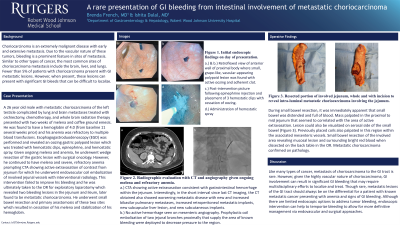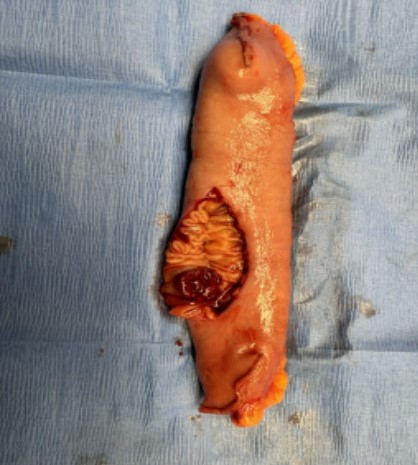Monday Poster Session
Category: GI Bleeding
P2529 - A Rare Presentation of GI Bleeding From Intestinal Involvement of Metastatic Choriocarcinoma
Monday, October 28, 2024
10:30 AM - 4:00 PM ET
Location: Exhibit Hall E

Has Audio
- BF
Brenda French, MD
Rutgers Robert Wood Johnson University Hospital
Wayne, PA
Presenting Author(s)
Brenda French, MD1, Gayathri Kollipara, DO2, Ishita Dalal, MD2
1Rutgers Robert Wood Johnson University Hospital, Wayne, PA; 2Rutgers Robert Wood Johnson University Hospital, New Brunswick, NJ
Introduction: Choriocarcinoma is an extremely malignant disease with early and extensive metastasis. Due to the vascular nature of these tumors, bleeding is a prominent feature in sites of metastasis. Similar to other types of cancer, the most common sites of choriocarcinoma metastasis include the brain, liver, and lungs. Fewer than 5% of patients with choriocarcinoma present with GI metastatic lesions. However, when present, these lesions can present with significant GI bleeds that can be difficult to localize.
Case Description/Methods: A 26 year old male with metastatic choriocarcinoma of the left testicle complicated by lung and brain metastases treated with orchiectomy, chemotherapy, and whole brain radiation therapy presented with two weeks of melena and coffee ground emesis. He was found to have a hemoglobin of 4.0 (from baseline 11 several weeks prior) and his anemia was refractory to multiple blood transfusions. Esophagogastroduodenoscopy (EGD) was performed and revealed an oozing gastric polypoid lesion which was treated with hemostatic clips, epinephrine, and hemostatic spray. Given ongoing melena and anemia, he underwent wedge resection of the gastric lesion with surgical oncology. However, he continued to have melena and severe, refractory anemia prompting CTA showing active extravasation of contrast from jejunum for which he underwent endovascular coil embolization of involved jejunal vessels with interventional radiology. This intervention failed to improve his bleeding and he was ultimately taken to the OR for exploratory laparotomy which revealed two bleeding lesions in the jejunum and ileum, later found to be metastatic choriocarcinoma. He underwent small bowel resection and primary anastomosis of these two sites which resulted in cessation of his melena and stabilization of his hemoglobin.
Discussion: Like many types of cancer, metastasis of choriocarcinoma to the GI tract is rare. However, given the highly vascular nature of choriocarcinoma, GI involvement can result in significant GI bleeding that may require multidisciplinary efforts to localize and treat. Though rare, metastatic lesions of the GI tract should always be on the differential for a patient with known metastatic cancer presenting with anemia and signs of GI bleeding. Although there are limited endoscopic options to address tumor bleeding, endoscopic intervention can help to temporize bleeding to allow for more definitive management via endovascular and surgical approaches.

Disclosures:
Brenda French, MD1, Gayathri Kollipara, DO2, Ishita Dalal, MD2. P2529 - A Rare Presentation of GI Bleeding From Intestinal Involvement of Metastatic Choriocarcinoma, ACG 2024 Annual Scientific Meeting Abstracts. Philadelphia, PA: American College of Gastroenterology.
1Rutgers Robert Wood Johnson University Hospital, Wayne, PA; 2Rutgers Robert Wood Johnson University Hospital, New Brunswick, NJ
Introduction: Choriocarcinoma is an extremely malignant disease with early and extensive metastasis. Due to the vascular nature of these tumors, bleeding is a prominent feature in sites of metastasis. Similar to other types of cancer, the most common sites of choriocarcinoma metastasis include the brain, liver, and lungs. Fewer than 5% of patients with choriocarcinoma present with GI metastatic lesions. However, when present, these lesions can present with significant GI bleeds that can be difficult to localize.
Case Description/Methods: A 26 year old male with metastatic choriocarcinoma of the left testicle complicated by lung and brain metastases treated with orchiectomy, chemotherapy, and whole brain radiation therapy presented with two weeks of melena and coffee ground emesis. He was found to have a hemoglobin of 4.0 (from baseline 11 several weeks prior) and his anemia was refractory to multiple blood transfusions. Esophagogastroduodenoscopy (EGD) was performed and revealed an oozing gastric polypoid lesion which was treated with hemostatic clips, epinephrine, and hemostatic spray. Given ongoing melena and anemia, he underwent wedge resection of the gastric lesion with surgical oncology. However, he continued to have melena and severe, refractory anemia prompting CTA showing active extravasation of contrast from jejunum for which he underwent endovascular coil embolization of involved jejunal vessels with interventional radiology. This intervention failed to improve his bleeding and he was ultimately taken to the OR for exploratory laparotomy which revealed two bleeding lesions in the jejunum and ileum, later found to be metastatic choriocarcinoma. He underwent small bowel resection and primary anastomosis of these two sites which resulted in cessation of his melena and stabilization of his hemoglobin.
Discussion: Like many types of cancer, metastasis of choriocarcinoma to the GI tract is rare. However, given the highly vascular nature of choriocarcinoma, GI involvement can result in significant GI bleeding that may require multidisciplinary efforts to localize and treat. Though rare, metastatic lesions of the GI tract should always be on the differential for a patient with known metastatic cancer presenting with anemia and signs of GI bleeding. Although there are limited endoscopic options to address tumor bleeding, endoscopic intervention can help to temporize bleeding to allow for more definitive management via endovascular and surgical approaches.

Figure: Portion of jejunum removed in small bowel resection demonstrating culprit bleeding lesion later found to be metastatic choriocarcinoma.
Disclosures:
Brenda French indicated no relevant financial relationships.
Gayathri Kollipara indicated no relevant financial relationships.
Ishita Dalal indicated no relevant financial relationships.
Brenda French, MD1, Gayathri Kollipara, DO2, Ishita Dalal, MD2. P2529 - A Rare Presentation of GI Bleeding From Intestinal Involvement of Metastatic Choriocarcinoma, ACG 2024 Annual Scientific Meeting Abstracts. Philadelphia, PA: American College of Gastroenterology.

